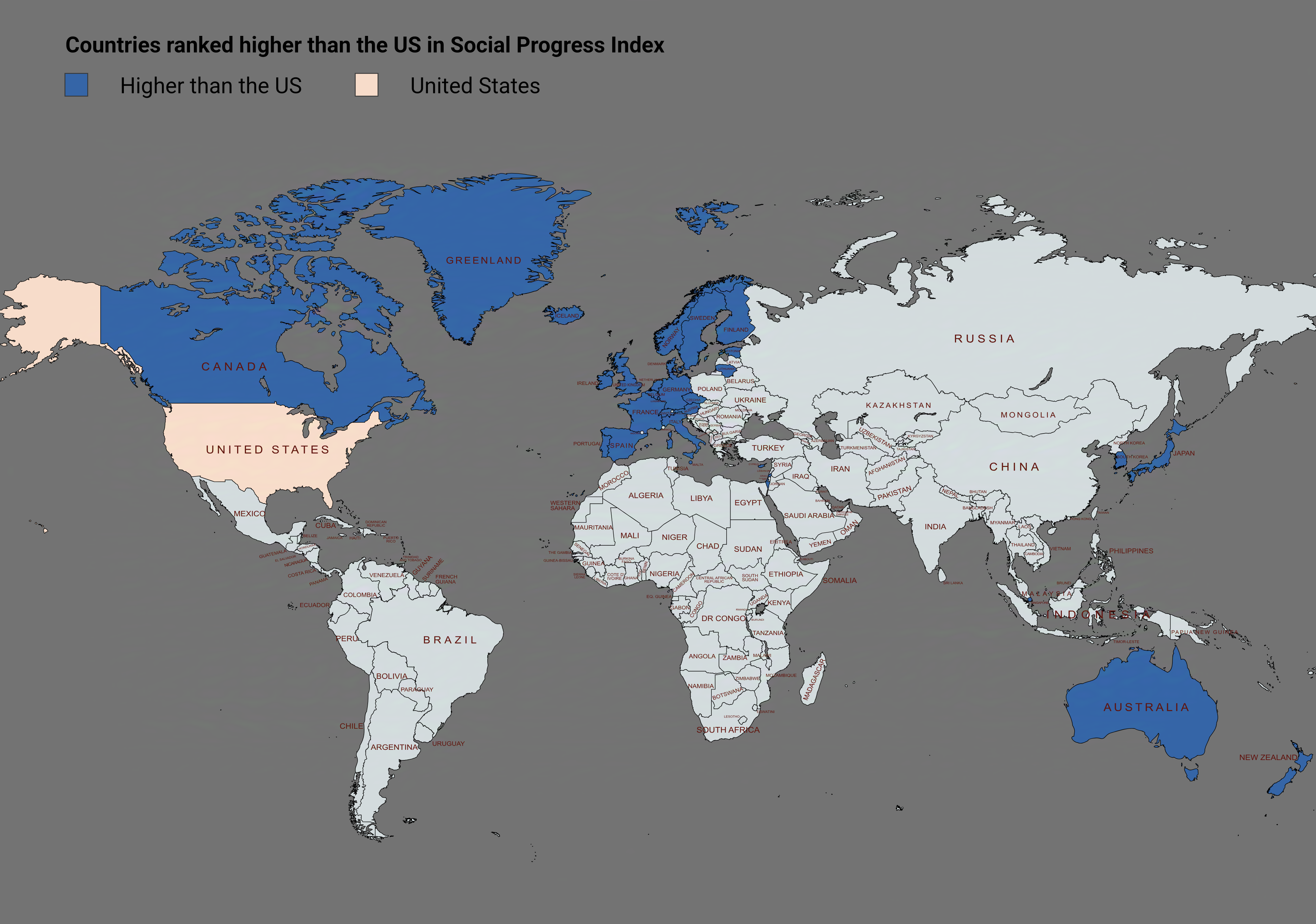Social Progress Index Rankings Map by Country


Marcus Rodriguez
Historical Geography Expert
Marcus Rodriguez specializes in historical cartography and geographic data analysis. With a background in both history and geography, he brings unique...
Geographic Analysis
What This Map Shows
The visualization titled "Countries Ranked Higher Than the US in Social Progress Index" provides a compelling overview of how various nations are performing in terms of social progress. Rather than focusing on economic indicators alone, the Social Progress Index (SPI) evaluates countries based on essential human needs, foundations of well-being, and opportunities for advancement. This map visually illustrates which countries have achieved a higher ranking than the United States, sparking curiosity about the factors contributing to their success.
Deep Dive into Social Progress
The Social Progress Index is a comprehensive metric that transcends traditional economic measures such as GDP. It focuses on three critical dimensions: Basic Human Needs, Foundations of Well-Being, and Opportunity. Each of these dimensions is further broken down into specific indicators that assess the overall quality of life and social well-being in a country.
1. **Basic Human Needs**: This dimension includes factors like water, nutrition, basic health, and shelter. For instance, countries that rank high in this category often have robust healthcare systems and social safety nets that ensure basic needs are met for all citizens.
2. **Foundations of Well-Being**: This aspect considers education, access to information, and health. Countries that excel in this dimension typically invest significantly in education and healthcare, ensuring citizens have the tools to lead productive lives. Norway, for example, is renowned for its high levels of education and health services, contributing to its top ranking.
3. **Opportunity**: This dimension assesses personal rights, freedom, and access to higher education. Nations that prioritize social equity and foster environments where individuals can pursue personal and professional aspirations often score higher here. Countries like Denmark and Finland are exemplary in promoting equal opportunities for all citizens.
Interestingly, while the United States boasts a strong economy, it doesn't always translate into high social progress rankings. Issues such as income inequality, healthcare accessibility, and educational disparities can hinder its overall social performance. For example, while the US ranks highly in economic metrics, it falls short in areas like healthcare access and social mobility, impacting its SPI score.
Regional Analysis
When examining the countries that rank higher than the US in the Social Progress Index, we can categorize them into distinct regions, each with its unique strengths and challenges.
- **Nordic Countries**: Nations like Denmark, Sweden, and Norway consistently rank among the top in the SPI. Their commitment to social welfare, education, and healthcare makes them models of social progress. With policies focusing on equality and support for vulnerable populations, these countries provide a high quality of life for their citizens.
- **Western Europe**: Countries such as Switzerland and the Netherlands also appear above the US in the SPI rankings. These nations have well-established social systems and prioritize public services that enhance social well-being. Interestingly, they also maintain strong economies, which complements their social policies.
- **New Zealand and Canada**: These countries represent regions outside of Europe that achieve higher social progress than the US. Both nations emphasize inclusivity, cultural diversity, and sustainable development, which contribute to their higher SPI rankings. Canada, for instance, has made significant strides in Indigenous rights and environmental policies, positively impacting its social progress.
- **Australia**: Known for its high quality of life, Australia ranks favorably due to its strong healthcare system and emphasis on education. However, challenges remain, especially regarding climate change and social inequalities that could affect future rankings.
What's fascinating is how different societal values and government policies play a crucial role in shaping social progress across these regions. While economic power is significant, it is clear that social policies and a commitment to human well-being often dictate higher SPI scores.
Significance and Impact
Understanding the Social Progress Index and the countries ranking higher than the US is essential for several reasons. First, it highlights the importance of prioritizing social issues alongside economic growth. Countries with high SPI scores often exhibit lower crime rates, better health outcomes, and higher levels of happiness among their citizens.
Moreover, as global challenges such as climate change and social inequality persist, the importance of social progress becomes increasingly evident. Countries that invest in social well-being are often more resilient in facing these challenges. For instance, nations with strong healthcare systems are better equipped to handle public health crises, as seen during the COVID-19 pandemic.
Looking ahead, the trends in social progress suggest a potential shift in how nations prioritize development. As younger generations advocate for sustainability, equity, and human rights, we may see a growing recognition of the need for comprehensive social policies that ensure no one is left behind. This transformation could redefine success beyond mere economic indicators, paving the way for a more equitable and just global society.
In conclusion, the Social Progress Index serves as a vital tool for understanding how countries are performing in terms of human development and well-being. By analyzing the nations that rank higher than the US, we can glean insights into effective policies and practices that enhance social progress worldwide.
Visualization Details
- Published
- August 18, 2025
- Views
- 186
Comments
Loading comments...